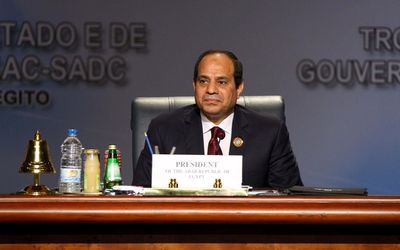PBS: Escaping Eritrea … [Read More...] about ካብ ውሽጢ ቤት ማእሰርታት ኤርትራ
Egypt’s Sisi cannot sustain one-man show
BY AHMED FETEHA AND SALMA EL-WARDANY, JUNE 11 2015, Business Daily (South Africa)
EGYPT’s parliament has been shut for three years, leaving President Abdel Fattah al-Sisi to function as a one-man legislature. He invited his 90-million constituents to e-mail him with their concerns. Citizens could submit their “inquiries about Egyptian affairs” and Mr Sisi would address them during his monthly televised speech to the nation, the presidency promised last month.

With so much power centred on the former general, there are not many other avenues open to Egyptians. The two main national political groups have been swept away in four years of upheaval. No date has been set for elections to replace the legislature, which was closed by courts in 2012. “The current model of government rests entirely on the president’s personal charisma, military background and hyper-nationalist rhetoric,” says Yasser el-Shimy, a research fellow at the Harvard Kennedy School in Cambridge, Massachusetts. “Virtually all executive and legislative powers are exercised by the president’s office without a modicum of power-sharing, accountability or oversight.”
Hosni Mubarak’s ruling party was banned after the 2011 uprising when protesters torched its offices. Two years later, a similar fate befell the Muslim Brotherhood. The broadest opposition group during Mubarak’s three-decade rule, it briefly held power after his fall but was labelled a terrorist group and driven underground when Mr Sisi led an army takeover.
The president’s e-mail hotline was part of a “wider strategy to enhance public dialogue” and was not meant to “substitute the role of the parliament”, his spokesman, Alaa Youssef, says. He was committed to holding elections for the legislature “as soon as possible and definitely before” year end. Mr Sisi has presided over a steadying of Egypt’s economy and a rebound on its financial markets; the benchmark stock index is up about 80% since June 2013 and eurobond yields have dropped more than half. Still, a wave of militant violence suggests political stability remains elusive.
The president received 15,000 e-mails in the first week, many of which were employment requests, state-run Al-Ahram newspaper reported last week. Nearly a third were from citizens expressing their appreciation of Mr Sisi, while 19% were ideas on how to develop the Suez Canal, eliminate bureaucracy or boost renewable energy. Only 14% were complaints. Sticking with one-man rule for too long would deepen the problems, says Ahmed Abd Rabou, a political science professor at Cairo University.
In that scenario, “the regime will be able to survive but at the expense of the public, of security, of economic stability”. The alternative was that Mr Sisi would recognise he could not run the country alone and would be “forced to moderate and open up, step by step, out of pressure”, he says.
After leading the overthrow of president Mohamed Mursi, Mr Sisi won 97% of votes in last year’s presidential election. Local media permit little criticism of the new regime’s figurehead. Anyone speaking against Mr Sisi was “stigmatised”, Mr Abd Rabou says. The media were “hysterical, and they inject their hysteria into the public”. “You are either with us or against us.”
That has been the backdrop for a crackdown on the Brotherhood, which quickly widened to include non-Islamist activists. Mursi has been sentenced to death, along with many other Brotherhood leaders. A law banning protests without police approval has put dozens behind bars. Activist Shaimaa el-Sabbagh was shot dead in January as she took part in a peaceful protest intended to lay wreaths in nearby Tahrir Square, the centre of protests since 2011.
Presidential spokesman Youssef says that in Egypt “no one is banned from expressing his or her beliefs within the bounds of a civil society”. He says “all countries enforce laws governing the peaceful and safe expression of dissent through mass gatherings in public spaces”. While the first post-Mursi cabinet contained members of political parties, including the premier and his deputy, Mr Sisi’s current government is mostly made up of technocrats who do not have other political loyalties.
In the absence of a legislature, Mr Sisi has issued laws in areas from investment and mining to counter-terrorism. He also authorised the Egyptian army to participate in the Saudi-led military operation against rebels in Yemen. Under the constitution, all legislation that is enacted by the president must be reviewed by a new parliament in the first 15 days after it is elected.
Voting was planned for March but was postponed indefinitely after the courts overturned electoral laws. The delay suggested that “the government was not in a hurry to have a parliament”, according to Mohamed Anwar el-Sadat, a former legislator and head of the Reform and Development Party. “They wanted the freedom to take quick decisions and issue legislation.”
Mr Sadat, the nephew of former president Anwar Sadat, has been supportive of Mr Sisi but has recently criticised the “political vacuum” in Egypt. The president enjoys “the popularity of a hero at a certain moment, for a certain incident”, he says. “For his support to last, he has to become a statesman with a political vision for the country,” Mr Sadat says.
While Mr Sisi could afford to lose some support for now, Mr Abd Rabou says he would eventually have to engage in “the same politics that Hosni Mubarak used — giving some space to the opposition, and cutting deals”.
